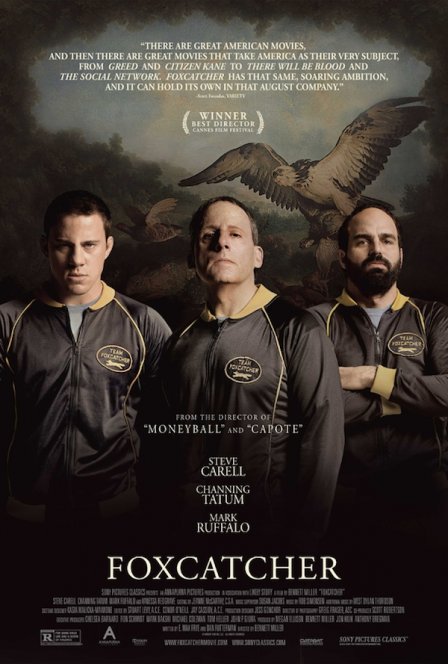Wrestling means intimacy. It’s difficult to distinguish an overpowering grapple from a brotherly embrace, or that same embrace from the act of clinging for dear life. Foxcatcher conveys this distinction through the toxic ménage à trois (so to speak) of Olympic gold medalists Mark and David Schultz (Channing Tatum and Mark Ruffalo, respectively) and their coach/backer John du Pont (Steve Carell). Their story is the latest piece, following Moneyball and Capote, of Bennett Miller’s career-long survey of the sweat and agony involved in creating American institutions. In this bleak, cynical glimpse of an era in which Reagan’s America was a backdrop for victory, paranoia, and betrayal, Foxcatcher is the stunning apex of Miller’s curiosity.
“I wanna talk to you about America, and why I wrestle,” Mark tells his audience early in the film. We never get much of an answer, but words aren’t Mark’s strongest suit anyway. There’s little passion in his speech, because its reserved for the mat. He’s training for the 1987 World Championships, as well as the 1988 Olympics; his focus renders him nearly mute. He trains with his older brother David, with whom he shares Olympic glory. David is a family man, headstrong and gregarious; he’s more popular than Mark, which keeps a subtle sibling rivalry on the mount. Mark may have the chance at another medal, but he clearly knows there’s something more to be had. As David drifts further into his own pursuits, Mark sinks further into ennui, but an opportunity arises to allow him out from beneath David’s shadow.
John du Pont — a self-avowed “ornithologist/philatelist/philanthropist” — digs wrestling. It’s not nearly as passé as foxhunting, to which the Du Pont family (the ones that own the chemical corporation) owes part of their prestige. Mother (Vanessa Redgrave) considers it a low sport, but he’ll show her. He invites Mark to his pastoral Pennsylvania home, amidst the pristine trophies and awards, and asks what he wants. Mark wants to win, and, with awkward pride and confidence, John approves. He provides him with room and board, a healthy salary, and a new training facility on the Du Pont homestead, quietly lethal in its resemblance to a slave plantation. It’s where John can look out, reflect on how his ancestors died there for American freedom, and be reminded what’s important. It becomes obvious that John is generous, enthusiastic, and downright insane.
If Du Pont produced this film (as he produced his own real-life propaganda), Foxcatcher would’ve ended with him and Mark embracing after the World Championship win. It’s the ignition, really, for the second half. As the Olympics approach, Mark is “on break,” as he describes his descent into the bottle to John, who’s still back in Utah. Though clearly the perpetrator, John disapproves; “you ungrateful ape,” he sneers at Mark. He convinces David (who previously refused John’s offer) to train the team, feeding Mark’s insecurity and depression. John’s plan works, but not in the way he hoped; as he watches, and stews, Mark is pushed towards David’s care. Fitting how the Cold War’s final years were the frame for Foxcatcher; the risk of the Other hangs overhead, and as we see in the remainder of the film (and in history), that risk squeezed into everyday American life.
I specifically use “American” because America is fetishistically mentioned throughout the film. Particularly by Du Pont; he sees this wrestling gig as an opportunity for patriotism, leading his men as though he were Mr. Burns rallying an army. In the 80s, our athletes were the greatest defense against the Rooskies. But even then, there’s a sense not just of the 1980s but the 1880s; patriotism, horses, and male bonding all recall the American western. These are American Men, no doubt, but each seem to have a varied concept of what it is to fit into that role.
That identity disconnect strengthens Foxcatcher’s drama, but it also speaks volumes about the actors and the roles they’ve become known for. Channing Tatum, the unflappable hunk, shows the vulnerability of chiseled perfection. Ruffalo, too, plays against type; his tranquility suggests a recovering Bruce Banner. Though easily the most confident of the bunch, his unease adds dimension. Carell’s performance has been talked to death, but it’s deserved. His turn as Du Pont, with a face like a Ralph Steadman creation, is the biggest deconstruction of his falsely confident, cringe-worthy demeanor that’s defined his career. The three are all playing roles they’ve played before, but never have they been this fragile or scary.
Director Miller is fascinated by motivation. He’s depicted the arduous process to bringing our American pastime to life. He’s shown what selfishness must be possessed in order to write the great American non-fiction novel. Foxcatcher digs deeper into what drives our heroes to succeed, and how their egos and personal issues dictate history. The things we treasure, and often take for granted, are never without turmoil (or bloodshed). No pain, no gain. It’s a necessary truism that can describe the defense of a nation, a personal victory, or the forging of a family. A singular success is never battled alone. Intimacy means wrestling.

